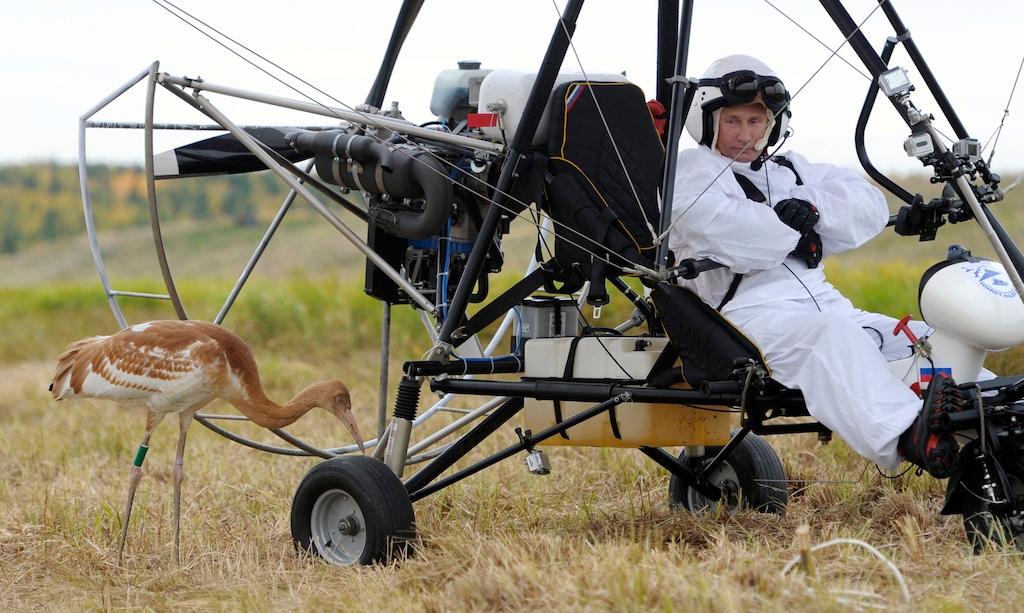Why the West can’t change Russia’s tune
Russian President Vladimir Putin glares at a crane as he takes part in a scientific experiment as part of the 'Flight of Hope' on on Sept. 5, 2012. The project will help preserve a rare species of cranes in the Jamalo-Nentsky region. Putin made three flights – the first to learn the process, and two others with the birds.
MOSCOW, Russia — A preliminary report by Dutch investigators released Tuesday all but confirmed the Malaysian airliner that crashed over war-torn eastern Ukraine in July was brought down by a missile.
The report stopped short of assigning blame, which US and Ukrainian officials believe lies squarely with pro-Russian rebels armed by Moscow.
But its conclusion that “high-energy objects” from outside the aircraft resulted in its mid-air break-up leaves little to the imagination.
What’s more, the study appears to disprove at least two official Russian theories offered over state-run media aimed at shielding the rebels from blame and weaving a convenient narrative for domestic consumption.
In theory, the findings should further pressure a Kremlin already facing another round of European sanctions. After all, it was Russia that allegedly supplied the missile system and fueled the violent insurgency that, in the words of US intelligence officials, created the conditions for its use.
But they won’t.
Less than two months after the tragedy seemed to galvanize international anger against Russian President Vladimir Putin, Ukraine’s military has suffered a humiliating reversal on the ground. Its government appears close to being forced to the negotiating table with the “terrorists” it once swore to eradicate.
Overwhelming circumstantial evidence suggests Russian military support had much to do with the stunning turnaround, but practically no Western officials have yet dared to call the move an “invasion.”
And that’s the point: As Russia has grown increasingly defiant in the face of Western admonition, it has exposed what look to be some glaring weaknesses in European and US diplomacy.
Observers have taken to calling it Putin’s “bluff” — the Russian president’s seemingly remarkable ability to exploit Western divisions and lay bare the limits of the post-Cold War West. It’s allowed him to navigate his country’s so-called “near abroad” in a way that’s effectively proven, as The Economist suggested on Sept. 6, that he cares far more than Brussels or Washington about Ukraine’s future.
The situation is especially damning for NATO. Some experts suggest the Cold War alliance has been left stumped as Russia has surreptitiously poured its troops into a sovereign European country on its doorstep.
“The Ukrainian crisis has revealed the political limits of the alliance, as leaders have been unable to promote the case for intervention,” wrote Alexandra de Hoop Scheffer, a senior fellow at the German Marshall Fund, in a New York Times opinion column on Tuesday.
In a telling move, the European Union approved a new round of sanctions on Monday but held off on enforcing them in order to assess whether Russia was honoring the ceasefire agreed between Ukrainian forces and separatist rebels.
Even if and when the EU does impose those sanctions, Russia has promised a punishing response.
With its recent sweeping ban on Western food imports, the Kremlin has already proved it’s not afraid to do so, even if it means paying dearly. The pay-off is clearly, if not always logically, much larger.
Meanwhile, the rebel leadership is demanding self-rule for the entire Donetsk and Luhansk regions — not just the area they currently control, which is steadily increasing anyway. Given its increasingly comfortable bargaining position, bolstered in no small part by Russian artillery and troop support, that prospect isn't totally unlikely.
It remains to be seen just how hard the newest round — and, indeed, previous rounds — of sanctions will bite.
But as far as cautious preliminary investigations by Dutch Safety Boards go, there is little hope in observers holding their breath for any concessions from Moscow.
Every day, reporters and producers at The World are hard at work bringing you human-centered news from across the globe. But we can’t do it without you. We need your support to ensure we can continue this work for another year.
Make a gift today, and you’ll help us unlock a matching gift of $67,000!
